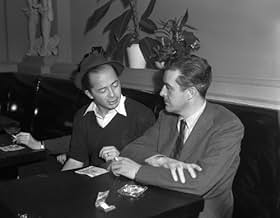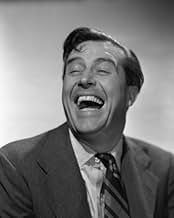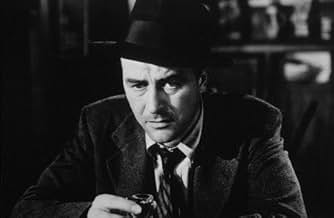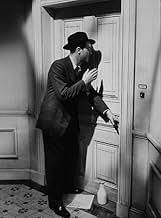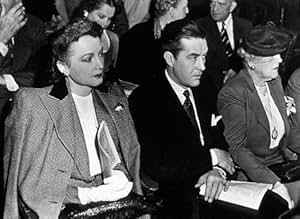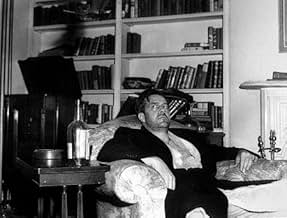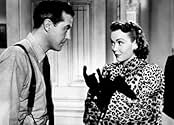IMDb-BEWERTUNG
7,9/10
42.184
IHRE BEWERTUNG
Das verzweifelte Leben eines chronischen Alkoholikers wird in einem viertägigen Trinkgelage verfolgt.Das verzweifelte Leben eines chronischen Alkoholikers wird in einem viertägigen Trinkgelage verfolgt.Das verzweifelte Leben eines chronischen Alkoholikers wird in einem viertägigen Trinkgelage verfolgt.
- Regie
- Drehbuch
- Hauptbesetzung
- 4 Oscars gewonnen
- 18 Gewinne & 3 Nominierungen insgesamt
Anita Sharp-Bolster
- Mrs. Foley
- (as Anita Bolster)
Andy Andrews
- Alcoholic
- (Nicht genannt)
Gene Ashley
- Male Nurse
- (Nicht genannt)
Walter Baldwin
- Man from Albany
- (Nicht genannt)
Harry Barris
- Pianist at Harry & Joe's
- (Nicht genannt)
Ian Begg
- Undetermined Secondary Role
- (Nicht genannt)
Eddie Borden
- Drunk in Alcoholic Ward
- (Nicht genannt)
Jess Lee Brooks
- Hospital Patient
- (Nicht genannt)
Zusammenfassung
Reviewers say 'The Lost Weekend' is a groundbreaking film with a realistic portrayal of alcoholism. Ray Milland's performance as Don Birnam is praised for its depth. Billy Wilder's direction and the film's visual style, including deep focus and Miklós Rózsa's haunting score, effectively convey addiction's despair. However, some find it melodramatic and repetitive, with an unrealistic ending. Despite criticisms, it is regarded as powerful and influential in cinema.
Empfohlene Bewertungen
10jotix100
The American cinema can count itself lucky with the wave of arrival of the best European talent in the days prior to World War II. Among the most distinguished directors that came to Hollywood was Billy Wilder who left a legacy, not only as a director, but in the many screen plays he wrote. One of his great works was "The Lost Week-end". Written with Charles Brackett, one of his most frequent collaborators, this is a film that dared to talk about a thing that no one dared to speak before: alcoholism.
If you haven't seen the film, please stop reading now.
On the opening scene of the picture we watch Don Birman, and his brother Wick packing suitcases for a long weekend in the country. We realize not everything is all right as we watch a bottle tied with a piece of string hanging out of a window. It's clear to see what was wrong with that picture, Don is an alcoholic! Wick, having enough common sense, wants to keep his brother near him, in order to control the situation.
Things get complicated with the arrival of Helen, the woman in love with Don. Helen St. James has been in a relationship with Don that has gone nowhere because of his drinking problem. Helen, as well as Wick, don't have the courage to have him committed to have him cured of his addiction. In fact, both are to blame about the condition affecting Don, but neither realize how deep is the problem.
In 1945 themes involving addiction were never told to the movie going public. Alcoholism was a vice that affected a lot of people in the country, but those were the days where people with drinking problems stayed in the closet, not daring to recognize how their lives were being ruined by the heavy use of alcohol.
We watch in horror as Don spends a weekend in hell going from one scheme to the next trying to get money to support his nasty habit. We also see Don Birman experience the worst night of his life when he is taken to a hospital, after falling down from a staircase. There, he sees first hand the horrors his addictions will bring to him. In a way, the exposure to the men in the hospital is a wake up call for Don, who decides to end it all because drinking has taken over his life. The movie should be seen by anyone suffering from this terrible social disease.
Ray Milland transforms himself into this troubled man. He gives an incredible performance. Mr. Milland has to be given credit in undertaking the portrayal of this lost soul in such a convincing fashion. By Hollywood standards, Ray Milland, an actor better known for his work in comedies, transforms himself into this Don Birman.
The supporting cast was excellent as well. Jane Wyman as Helen St. James is seen in one of her better roles of her career. Phillip Terry, as Wick, the kind brother is also good. Howard DaSilva, the bartender Nat, makes an impressive appearance in the film. Doris Dowling, as Gloria the friendly prostitute is equally effective.
Of course, this is a movie that shows Billy Wilder at his best. By filming on location in Manhattan, a rich texture is added. From Nat's bar we can watch the trams that circulated on Third Ave. at that time, as well as the 3rd. Av. El. The excellent black and white cinematography of John Seitz looks as good today, as it must have looked in 1945, when the film was released. The music score by the great Milos Rozsa is haunting without being too obvious.
This is, without a doubt, one of Billy Wilder's best movies, one that endures the passing of time. Mr. Wilder dared to speak out loud about something no one wanted to talk about.
If you haven't seen the film, please stop reading now.
On the opening scene of the picture we watch Don Birman, and his brother Wick packing suitcases for a long weekend in the country. We realize not everything is all right as we watch a bottle tied with a piece of string hanging out of a window. It's clear to see what was wrong with that picture, Don is an alcoholic! Wick, having enough common sense, wants to keep his brother near him, in order to control the situation.
Things get complicated with the arrival of Helen, the woman in love with Don. Helen St. James has been in a relationship with Don that has gone nowhere because of his drinking problem. Helen, as well as Wick, don't have the courage to have him committed to have him cured of his addiction. In fact, both are to blame about the condition affecting Don, but neither realize how deep is the problem.
In 1945 themes involving addiction were never told to the movie going public. Alcoholism was a vice that affected a lot of people in the country, but those were the days where people with drinking problems stayed in the closet, not daring to recognize how their lives were being ruined by the heavy use of alcohol.
We watch in horror as Don spends a weekend in hell going from one scheme to the next trying to get money to support his nasty habit. We also see Don Birman experience the worst night of his life when he is taken to a hospital, after falling down from a staircase. There, he sees first hand the horrors his addictions will bring to him. In a way, the exposure to the men in the hospital is a wake up call for Don, who decides to end it all because drinking has taken over his life. The movie should be seen by anyone suffering from this terrible social disease.
Ray Milland transforms himself into this troubled man. He gives an incredible performance. Mr. Milland has to be given credit in undertaking the portrayal of this lost soul in such a convincing fashion. By Hollywood standards, Ray Milland, an actor better known for his work in comedies, transforms himself into this Don Birman.
The supporting cast was excellent as well. Jane Wyman as Helen St. James is seen in one of her better roles of her career. Phillip Terry, as Wick, the kind brother is also good. Howard DaSilva, the bartender Nat, makes an impressive appearance in the film. Doris Dowling, as Gloria the friendly prostitute is equally effective.
Of course, this is a movie that shows Billy Wilder at his best. By filming on location in Manhattan, a rich texture is added. From Nat's bar we can watch the trams that circulated on Third Ave. at that time, as well as the 3rd. Av. El. The excellent black and white cinematography of John Seitz looks as good today, as it must have looked in 1945, when the film was released. The music score by the great Milos Rozsa is haunting without being too obvious.
This is, without a doubt, one of Billy Wilder's best movies, one that endures the passing of time. Mr. Wilder dared to speak out loud about something no one wanted to talk about.
The script and score are superb and the acting flawless. Ray Milland is riveting in the role of a man who is as consumed by alcohol as it is consuming him. He lives and breathes for it and all around him become secondary including his long suffering girlfriend.
There is always a girl like this in the life of a good looking useless purposeless alcoholic kept afloat by either a wife or other family member, in this case a brother who pays the bills and tries to sober him up and dry him out periodically.
The score is relentless and highly avant Gard for its time, featuring music normally backing sci-fi flicks. Some of the scenes are profoundly frightening, his stay in the drunk tank with a sadistic feminine male nurse outlining all the horrors that await him and his DTs which feature a bat biting the head off a bird.
Very well done. I felt the ending was a little too pat, that would be my only fault with this.
9 out of 10. Excellent.
There is always a girl like this in the life of a good looking useless purposeless alcoholic kept afloat by either a wife or other family member, in this case a brother who pays the bills and tries to sober him up and dry him out periodically.
The score is relentless and highly avant Gard for its time, featuring music normally backing sci-fi flicks. Some of the scenes are profoundly frightening, his stay in the drunk tank with a sadistic feminine male nurse outlining all the horrors that await him and his DTs which feature a bat biting the head off a bird.
Very well done. I felt the ending was a little too pat, that would be my only fault with this.
9 out of 10. Excellent.
Seedy bars, pawnshops, and an array of elaborate hiding places are the overriding images from this film. The Lost Weekend is a grimly realistic account of four days in the life of a chronic alcoholic, played by Ray Milland. In films of this quality one always takes away unforgettable images. The most striking is Milland's drunken efforts to remember where in his apartment the last hiding place he used is. Degraded and thoroughly beaten by his addiction, his last refuge is to try and keep it a secret from those who still love him. Billy Wilder's direction and script is brilliant - sympathetic, but unpatronising in his handling of a delicate and rarely dealt with affliction. Not until Nicolas Cage's portrayal of a man determined to drink himself to death in Leaving Las Vegas, has alcoholism been dealt with so well. Milland's performance is first rate - no hammy shlurring of words - and the atmosphere is dark and seedy like the bars he frequents. The scene where he spends several hours trying to find an open pawnshop on a public holiday is both harrowing and dazzling - it is remeniscent of the filmic image of a parched man trying to cross the desert.
10Don-102
From the first shot of a bottle hanging from a drunk's apartment, we realize we are about to see a clever addict and a weekend of his demented exploits. Ray Milland has an honest face, not unlike Jimmy Stewart's, however, with this character it is only skin-deep. The great thing about his performance and the film as a whole, is that his face will gradually change, becoming dark and chilly, just like Stewart's in IT'S A WONDERFUL LIFE. Stewart had lost his life momentarily. Milland has lost his soul to the bottle and he will stop at nothing to quench his thirst.
This really is a textbook example of the alcoholic's lies and schemes, a precursor to LEAVING LAS VEGAS, although there are people in this film who care about the drinker from the beginning. He just can't stop and we start to lose whatever sympathy we had for him because of how he treats other people. This is a drunk with a sober man wanting to come out, but Wilder's script dives deeply into the unpredictable outcomes of most alcoholics.
LOST WEEKEND was innovative and was almost never released because test audiences could not take the film's realism. The hospital sequence retains its horror, and Milland's withdrawal-induced hallucination of a rat in the wall was like him looking in the mirror. See this movie and you will come away with a completely informed and scary anthology of the antics of a hopeless alcoholic. This is amazing considering it came out of the old Hollywood system.
This really is a textbook example of the alcoholic's lies and schemes, a precursor to LEAVING LAS VEGAS, although there are people in this film who care about the drinker from the beginning. He just can't stop and we start to lose whatever sympathy we had for him because of how he treats other people. This is a drunk with a sober man wanting to come out, but Wilder's script dives deeply into the unpredictable outcomes of most alcoholics.
LOST WEEKEND was innovative and was almost never released because test audiences could not take the film's realism. The hospital sequence retains its horror, and Milland's withdrawal-induced hallucination of a rat in the wall was like him looking in the mirror. See this movie and you will come away with a completely informed and scary anthology of the antics of a hopeless alcoholic. This is amazing considering it came out of the old Hollywood system.
As a recovering alcoholic (14 years sober) this remains as the first great film dealing with alcoholism. Ray Milland"s great performance shows realistically the insanity of drinking and the struggles. The promises and hidden bottles will ring true to anyone who has dealt with the problem. Billy Wilder's career was noted for his comedies but he showed in "Lost Weekend" that he knew how to deal with serious matter as well. The ending shot is a classic and will be memorable for anyone seeing the film. Check out "Days of Wine & Roses" as well.
Oscars Best Picture Winners, Ranked
Oscars Best Picture Winners, Ranked
See the complete list of Oscars Best Picture winners, ranked by IMDb ratings.
Wusstest du schon
- WissenswertesBilly Wilder claimed the liquor industry offered Paramount Pictures $5 million not to release the film; he also suggested that he would have accepted had they offered it to him personally.
- PatzerWhen the waiter gives Don the check at Harry & Joe's and he reaches for it, the glass, ashtray, napkin, and cigarette all change position between camera shots.
- Zitate
[Nat moves to wipe away the circle of whisky from Don Birnam's glass]
Don Birnam: Don't wipe it away, Nat. Let me have my little vicious circle. You know, the circle is the perfect geometric figure. No end, no beginning.
- VerbindungenEdited into Tote tragen keine Karos (1982)
- SoundtracksLa Traviata
(1853) (uncredited)
Music by Giuseppe Verdi
Libretto by Francesco Maria Piave
Libiamo ne' lieti calici (Drinking Song) Performed by John Garris and Theodora Lynch with The San Francisco Opera Company
Top-Auswahl
Melde dich zum Bewerten an und greife auf die Watchlist für personalisierte Empfehlungen zu.
Details
Box Office
- Budget
- 1.250.000 $ (geschätzt)
- Weltweiter Bruttoertrag
- 813 $
- Laufzeit1 Stunde 41 Minuten
- Farbe
- Seitenverhältnis
- 1.37 : 1
Zu dieser Seite beitragen
Bearbeitung vorschlagen oder fehlenden Inhalt hinzufügen


